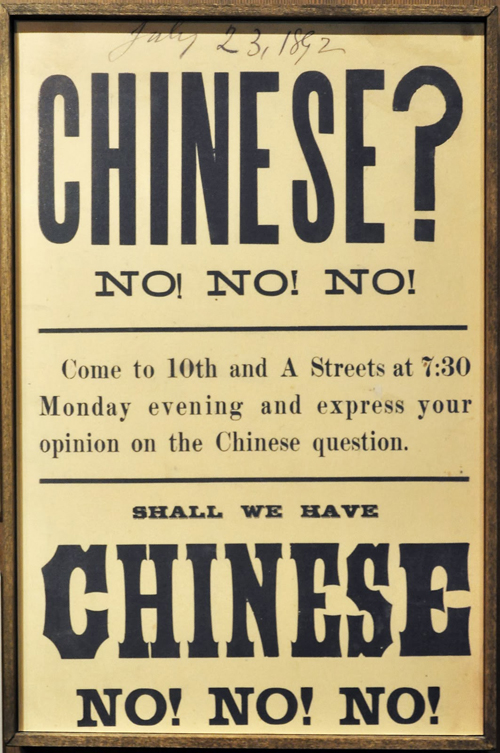By Staff
Northwest Asian Weekly

Anti-Chinese poster from 1800’s
Seattle City Councilmember Nick Licata will introduce a resolution July 29 that expresses regret for the anti-Chinese legislation and riots in the 1800s. The resolution acknowledges the contributions of Chinese to Seattle, and reaffirms the City’s commitment to civil rights of all people.
“The early Chinese contributed greatly to the development of what was then the town of Seattle and Washington Territory,” said OCA Greater Seattle vice-president Connie So, who also teaches at the University of Washington American Ethnic Studies Program. In Seattle they [Chinese] laid the tracks for the first railroads to the town; graded Pike, Union, Washington and Jackson Streets; worked at local canneries and sawmills; grew produce; worked as domestic servants; dug the earliest portion of the Lake Washington Ship Canal, and established a Chinese quarter in what is now Pioneer Square. At one point, there was 700 Chinese in the town, about 10 percent the Seattle’s total population.
Yet, a number of discriminatory and unfair laws were passed at the federal, territorial and local levels to get rid of all the Chinese because they were seen as “unfair labor,” inferior, deceitful, and heathens based on race. In 1882, the federal government passed the infamous Chinese Exclusion Act, which prohibited Chinese laborers from entering the United States. When these laws failed to exclude or get rid of the Chinese here, mobs forcibly and brutally drove them out of Seattle and other towns in the Territory. The 1886 anti-Chinese riot in Seattle led to the removal of some 250 Chinese.
Excerpts from the draft of the proposed resolution reveal much of the tragic suffering and harm inflicted:
A RESOLUTION expressing regret for the Anti-Chinese legislation …
WHEREAS the Chinese presence in Seattle dates back to 1860; and
WHEREAS many Chinese were engaged in constructing the first railroads to and from Seattle; grading many of the city’s roads in Pike, Union, Jackson and Washington Streets; worked at local canneries and sawmills, dug the earliest portion of the Lake Washington Canal; and worked as “domestic servants”; and
WHEREAS a wave of anti-Chinese sentiment swept the United States including Washington Territory which fostered an atmosphere of racial discrimination that deprived Chinese immigrants of civil rights and privileges afforded others; and
WHEREAS Washington Territory passed anti-Chinese legislation including:
A measure that denied Chinese the right to vote (1853)
An “Act to Protect Free White Labor Against Competition with Chinese Coolie Labor and to Discourage the Immigration of Chinese in the Territory,” which lead to the “Chinese Police (poll) Tax (1864)
“An Act relating to Witnesses and Evidence,” which prohibited Chinese from giving evidence in the courts in cases involving whites (1864)
A law which disallowed Chinese from voting in school elections (1867)
Legislation which disallowed Chinese from owning land; and
WHEREAS this was followed by legislation passed by the United States Congress including the:
Chinese Exclusion Act (1882) which prohibited immigration of Chinese laborers and prohibited Chinese from becoming U.S. citizens. This Act was the first time the U.S. restricted immigration based on race and nationality. Other Chinese Exclusion Acts were subsequently passed to extend the1882 Act which was not repealed until 1902.
Scott Act (1888) prohibited all Chinese laborers who left the U.S. from reentering.
Geary Act (1892) required all Chinese persons in the U.S. –but no other race—to register with the federal government in order to obtain “certificates of residence.”; and
WHEREAS There were widespread riots in many areas of Washington Territory to get rid of the Chinese in Tacoma, Olympia, Bellingham, and other towns; and
WHEREAS the Seattle City Council, in 1885, passed…discriminatory ordinances which while not mentioning the word “Chinese” were aimed at the living conditions and occupations of the Chinese in Seattle:
Ordinance 694 required 512 cubic feet of space for each person in a lodging, room or hotel. Since the Chinese were not allowed to bring their wives or families, and worked long hours, these single men often lived in small, overcrowded living spaces …
WHEREAS on February 7, 1886, an anti-Chinese riot ensued and an angry mob of 1500 invaded the Chinese quarters in Seattle and forced some 350 Chinese on wagons, hauled them to the dock and put them on the Queen of Pacific steamer. Nearly all of the Chinese who were removed from Seattle left on that steamer and subsequent boats; and
WHEREAS, the community despite this anti-Chinese sentiment and discriminatory laws established a Chinese settlement in Seattle known as Chinatown, that has existed since the 1870s, which provides a commercial, residential and cultural base for the Chinese;
WHEREAS despite decades of systematic, pervasive, and sustained discrimination, Chinese immigrants and Chinese Americans persevered and have continued to contribute and play a significant role in the growth of Seattle; and
WHEREAS racial and ethnic diversity are among the Seattle’s most important strengths and goals and Seattle’s Chinese have positively added to the racial and ethnic diversity of the City and
WHEREAS, the City of Seattle is committed to equal rights and social justice for all …
BE IT RESOLVED BY THE CITY COUNCIL OF THE CITY OF SEATTLE, THE MAYOR CONCURRING, THAT:
Section 1. That the Seattle City Council deeply regrets the anti-Chinese sentiments and passage of discriminatory ordinances directed at the Chinese that led to the 1886 anti-Chinese riots in the city and the expulsion of the Chinese;
Section 2. Acknowledges the contributions the early Chinese made to the development of Seattle and the continuing contributions of Chinese Americans to this city; and
Section 3: Reaffirms its commitment to the civil rights of all people and celebrates the contributions that all immigrants have made to Seattle in the past and present. (end)
Staff can be reached at info@nwasianweekly.com.



